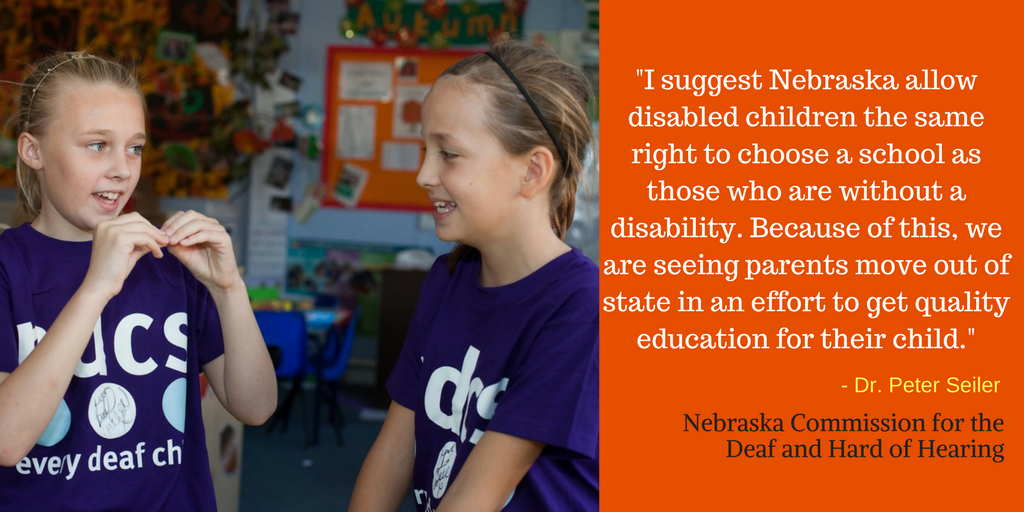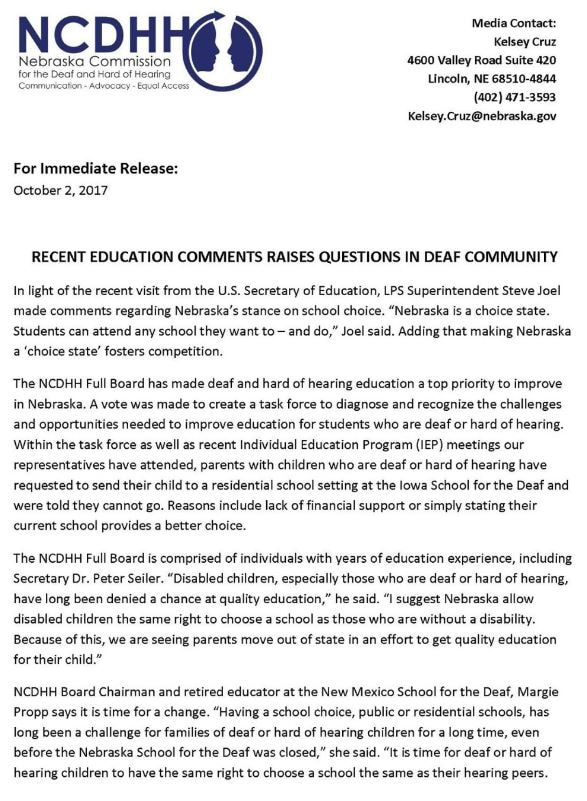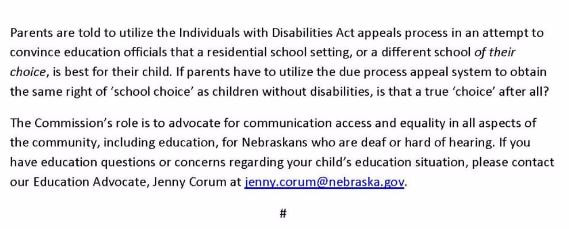|
Last week, the Nebraska Commission for the Deaf and Hard of Hearing issued a press release in which they question comments made in the wake of a visit from the U.S. Secretary of Education. In particular, the press release quotes LPS superintendent Steve Joel as saying, "Nebraska is a choice state. Students can attend any school they want to -- and do."
The NCDHH knows this isn't true. Members of the task force have attended IEP meetings in which parents with children who are deaf or hard of hearing have requested to send their children to a residential school setting at the Iowa School for the Deaf, and they've been told they can't go. In fact, according to the press release, these parents have been "told to utilize the Individuals with Disabilities Act appeals process in an attempt to convince education officials that a residential school setting, or a different school of their choice, is best for their child." The press release asks the question, "If parents have to utilize the due process appeal system to obtain the same right of 'school choice' as children without disabilities, is that true 'choice' after all?" Why don't these parents request to send their children to a school for the deaf or hard of hearing right here in Nebraska? The Nebraska School for the Deaf closed in the 90's, and nothing has replaced it. If a family with a deaf or hard of hearing child lived in St. Paul, the child could attend Metro Deaf School, a free public charter school providing a bilingual and interdisciplinary curriculum. Parents living in Florida could use a tax-credit scholarship to send their deaf or hard of hearing child to Blossom Montessori School for the Deaf, a private school that uses a combination of Montessori-style teaching and visually oriented curriculum. Parents in Arizona can use an ESA (Education Savings Account) to pay for tuition for schools for the deaf or hard or hearing as well as for private tutors, therapies, and other services their children need. So it's no wonder that parents are leaving Nebraska in order to access the educational resources their children need. Children in Nebraska do not have access to any of the opportunities mentioned above, and that's why Nebraska is ranked #50 in the Parent Power Index. Until this upcoming session, Nebraska legislators have not even been willing to discuss expanding educational opportunity for children in this state. Instead, education reform bills have been stopped in committee by senators who are beholden to the teachers union, district administrators, Nebraska Loves Public Schools, Stand for Schools, and other organizations that are more concerned about maintaining control over systems than they are about providing opportunities for individual children to succeed. The NCDHH is a state agency with 13 employees and 9 board members. They have offices in Lincoln, Omaha, North Platte, and other locations. They hear the stories of children across the state, and they know what they're talking about. In their recent press release, the NCDHH board states that parents have been denied requests to send their children to the Iowa School for the Deaf because "their current school provides a better choice." This attitude that administrators know better than parents is the reason families are leaving Nebraska in search of freedom and better opportunities for their children. Nebraska legislators have a chance this upcoming session to offer meaningful opportunities for the parents and children of this state. They can approve LB295, a measure that would offer tax credits to individuals or organizations that contribute to K-12 scholarship funds. With a scholarship, perhaps some of these parents referenced by the NCDHH could afford to send their children to schools that offer the opportunities they're looking for. NCDHH Board Chairman and retired educator at the New Mexico School for the Deaf Margie Propp said, "It is time for the deaf or hard of hearing children to have the same right to choose a school the same as their hearing peers."
1 Comment
Frank R. Turk
10/11/2017 01:37:57 pm
The primary purpose of school is to provide a four-'R' curriculum that during the entire academic year socializes deaf children with life after school. The traditional three Rs teach how to read, write and do arithmetic, but they do not teach how to live. Hence, given the need to compensate for the loss of sound experiences, deaf children need the fourth 'R' of education, resourcefulness, that develops real life skills such as leadership, empowerment, attitude, discipline, empathy, responsibility, struggle, humility, initiative, and perseverance. Those real life skills are developed through the after-school activities 12 months a year, including special summertime activities featuring exposure to and involvement with successful deaf role models. Deaf adults used to be what the deaf children are, they felt the way they are feeling; they saw things the way they are seeing them, and so on. Only when all school administrators, staff members, and parents collaborate and partner with successful deaf people, can our deaf children achieve their real potential in school, college, workplace, career, and community life.
Reply
Your comment will be posted after it is approved.
Leave a Reply. |
|




 RSS Feed
RSS Feed